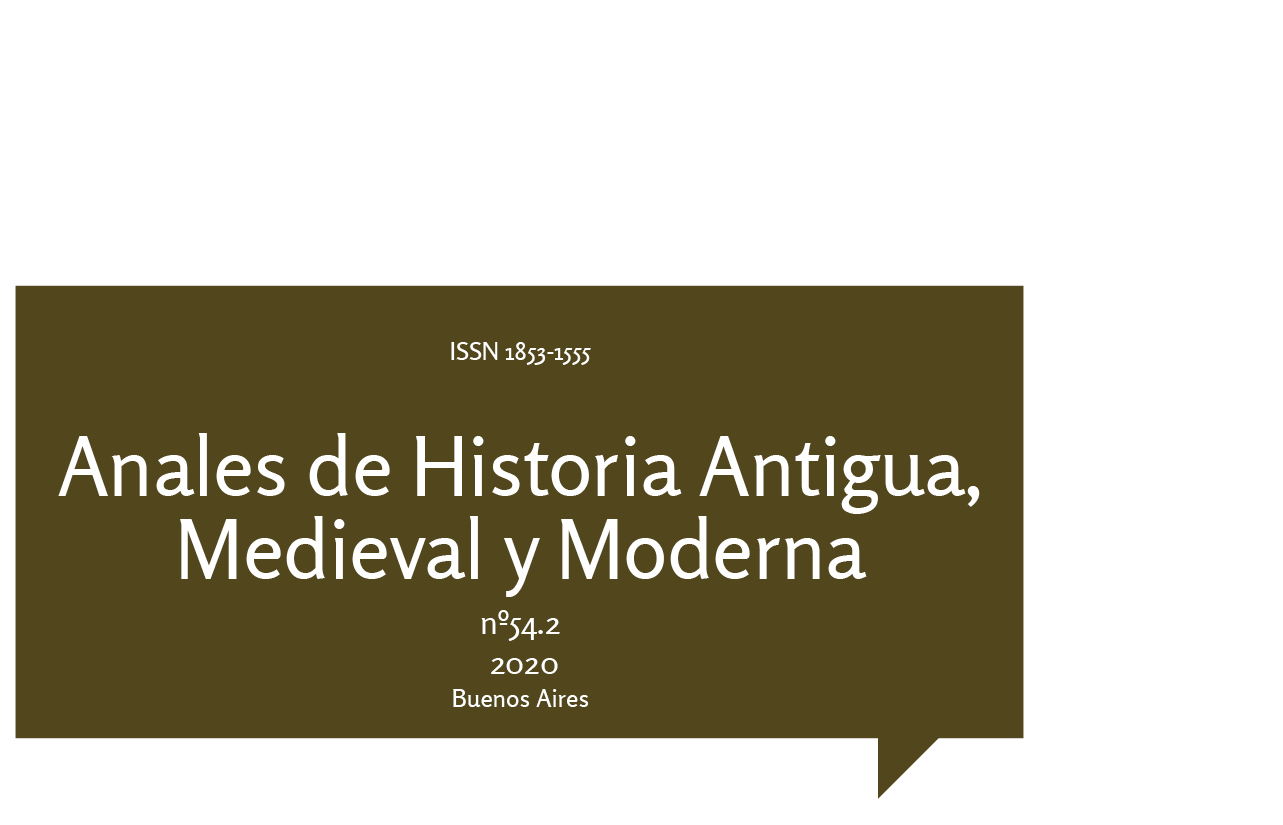Contra Teopompo: formación retórica y escritura de la historia en Polibio
Resumen
El presente trabajo aborda la crítica que Polibio realiza contra Teopompo de Quíos desde una perspectiva que destaca su formación retórica. Se propone correr el foco de atención en lo que refiere a los motivos que llevan al de Megalópolis a lanzar una invectiva contra Teopompo enfatizando no en lo que se escribe, sino en cómo se escribe. El problema, entonces, es el modo en que el lógos resulta más efectivo para convencer respecto del conocimiento específico que el discurso historiográfico quiere trasmitir. La falta de coherencia o de claridad atribuida a Teopompo atenta contra la mencionada efectividad del discurso. De ahí que la discusión no se concentre en la veracidad de los hechos o su interpretación, sino en la habilidad para exponerlos con claridad, concisión y verosimilitud. Se afirma, a modo de conclusión, que en el centro de la diatriba se encuentra una retorización del discurso historiográfico que se debe, en parte, a que el uso de los ejercicios retóricos está asociado a determinadas virtudes del lógos.Descargas
Citas
Alexiou, E. (2018). Tόπος ἐγκωμιαστικός (Polybius 10.21.8): The Εncomium of Philopoemen and its Ιsocratic Βackground. En N. Miltsios y M. Tamiolaki (Eds.), Polybius and His Legacy (241-255). Berlín: Walter de Gruyter.
Balasch Recort, M. (Trad.). (1981). Polibio, Historias. Madrid: Gredos.
Bearzot, C. (2005). Polibio e Teopompo: osservazioni di metodo e giudizio morale. En The Shadow of Polybius. Intertextuality as a Research Tool in Greek Historiography. Proceedings of the International Colloquium, Leuven, 21-22 September 2001 (55-71). Lovaina: Peeters.
Büttner-Wobst, Th. (Ed.). (1995 [1889]). Polybii Historiae. Stuttgart: Teubner.
Campos Daroca, J. y López Cruces, J. L. (1990). Teopompo y el saber revelado. Florentia Iliberritana. Revista de Estudio de Antigüedad Clásica, 1, 75-82.
Connor, W. R. (1967). History without Heroes: Theopompus Treatment of Philip of Macedon. GRBS, 8, 133-154.
Gibson, C. (2004). Learning Greek History in the Ancient Classroom: The Evidence of the Treatises on Progymnasmata. CPh, 99 (2), 103-129.
Kennedy, G. (1963). The Art of Persuasion in Greece. Princeton: Princeton University Press.
Khellaf, K. (2018). Incomplete and Disconnected: Polybius, Digression, and its Historiographical Afterlife. En N. Miltsios, y M. Tamiolaki (Eds.), Polybius and His Legacy (167-201). Berlín: Walter de Gruyter.
Lens, J. (1987). Las Filípicas de Teopompo y la tradición de la caracterización psicológica en la literatura griega. Ítaca : quaderns catalans de cultura clàssica, 3, 47-70.
Momigliano, A. (1984). Teopompo. En A. Momigliano (Ed.), La historiografía griega (168-194). Barcelona: Crítica.
Moreno Leoni, A. (2017). Entre Roma y el Mundo Griego. Memoria, autorepresentación y didáctica del poder en las Historias de Polibio. Córdoba: Editorial Brujas.
Olivera, D. (2017). A Filopemen: historia y retórica en Polibio. Anales de Filología Clásica, 30 (1), 33-42.
Parmeggiani, G. (2011). Eforo di Cuma. Studi di storiografia greca. Bologna: Pàtron Editore.
Parmeggiani, G. (2018). Polybius and the Legacy of Fourth-Century Historiography. En N. Miltsios y M. Tamiolaki (Eds.), Polybius and His Legacy (277-297). Berlín: Walter de Gruyter.
Pédech, P. (1951). Polybe et l'Éloge de Philopoemen. Revue des Études Grecques, 64, 82-103.
Pordomingo, F. (2007). Ejercicios preliminares de la composición retórica y literaria en papiro: el encomio. En J. A. Fernández Delgado, F. Pordomingo y A. Stramaglia (Eds.), Escuela y literatura en Grecia Antigua. Actas del simposio internacional Universidad de Salamanca 17-19 noviembre de 2004 (405-453). Nápoles: La Buona Stampa-Ercolano.
Reche Martínez, M. D. (Trad.). (1991). Teón-Hermógenes-Aftonio, Ejercicios de retórica. Madrid: Gredos.
Thornton, J. (2013). Oratory in Polybius Histories. En C. Kremmydas y K. Tempest (Eds.), Hellenistic Oratory. Continuity and Change (20-42). Oxford: Oxford University Press.
Walbank, F. (1967). A Historical Commentary on Polybius, Vol. II. Oxford: Clarendon Press.
Walbank, F. (1979). A Historical Commentary on Polybius. Vol. III. Oxford: Clarendon Press.
Zangara, A. (2007). Voir l´Histoire. Théories anciennes du récit historique II siècle avant J.-C. – II siècle après J.-C. París: Librairie Philosophique J. Vrin.
Derechos de autor 2020 Anales de Historia Antigua, Medieval y Moderna

Esta obra está bajo licencia internacional Creative Commons Reconocimiento-CompartirIgual 4.0.








